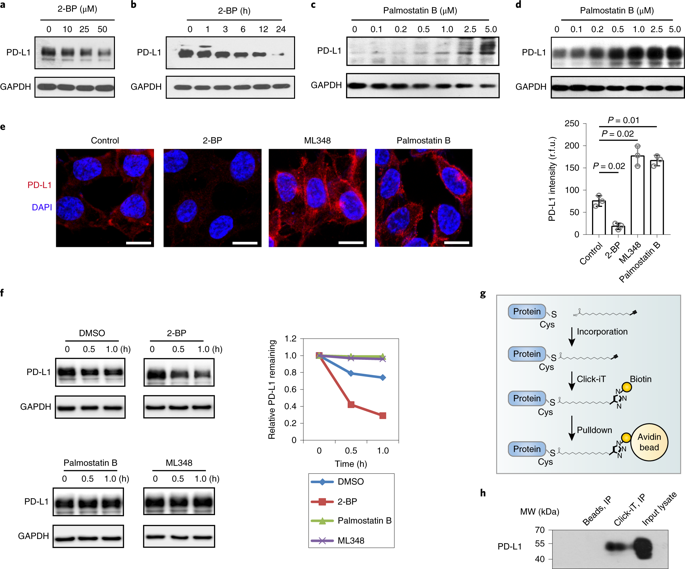当前位置:
X-MOL 学术
›
Nat. Biomed. Eng.
›
论文详情
Our official English website, www.x-mol.net, welcomes your
feedback! (Note: you will need to create a separate account there.)
Inhibiting PD-L1 palmitoylation enhances T-cell immune responses against tumours.
Nature Biomedical Engineering ( IF 26.8 ) Pub Date : 2019-03-25 , DOI: 10.1038/s41551-019-0375-6 Han Yao 1 , Jiang Lan 2 , Chushu Li 1 , Hubing Shi 2 , Jean-Philippe Brosseau 3 , Huanbin Wang 1 , Haojie Lu 4 , Caiyun Fang 4 , Yao Zhang 1 , Lunxi Liang 1, 5 , Xiaolin Zhou 6 , Chaojun Wang 7 , Yu Xue 8 , Yun Cui 1 , Jie Xu 1
Nature Biomedical Engineering ( IF 26.8 ) Pub Date : 2019-03-25 , DOI: 10.1038/s41551-019-0375-6 Han Yao 1 , Jiang Lan 2 , Chushu Li 1 , Hubing Shi 2 , Jean-Philippe Brosseau 3 , Huanbin Wang 1 , Haojie Lu 4 , Caiyun Fang 4 , Yao Zhang 1 , Lunxi Liang 1, 5 , Xiaolin Zhou 6 , Chaojun Wang 7 , Yu Xue 8 , Yun Cui 1 , Jie Xu 1
Affiliation

|
Checkpoint blockade therapy targeting the programmed-death ligand 1 (PD-L1) and its receptor programmed cell death 1 promotes T-cell-mediated immunosurveillance against tumours, and has been associated with marked clinical benefit in cancer patients. Antibodies against PD-L1 function by blocking PD-L1 on the cell surface, but intracellular storage of PD-L1 and its active redistribution to the cell membrane can minimize the therapeutic benefits, which highlights the importance of targeting PD-L1 throughout the whole cell. Here, we show that PD-L1 is palmitoylated in its cytoplasmic domain, and that this lipid modification stabilizes PD-L1 by blocking its ubiquitination, consequently suppressing PD-L1 degradation by lysosomes. We identified palmitoyltransferase ZDHHC3 (DHHC3) as the main acetyltransferase required for the palmitoylation of PD-L1, and show that the inhibition of PD-L1 palmitoylation via 2-bromopalmitate, or the silencing of DHHC3, activates antitumour immunity in vitro and in mice bearing MC38 tumour cells. We also designed a competitive inhibitor of PD-L1 palmitoylation that decreases PD-L1 expression in tumour cells to enhance T-cell immunity against the tumours. These findings suggest new strategies for overcoming PD-L1-mediated immune evasion in cancer.
中文翻译:

抑制PD-L1棕榈酰化可增强针对肿瘤的T细胞免疫反应。
针对程序性死亡配体1(PD-L1)及其受体程序性细胞死亡1的检查点封锁疗法可促进T细胞介导的针对肿瘤的免疫监视,并已与癌症患者的显着临床益处相关联。针对PD-L1的抗体通过阻断细胞表面上的PD-L1发挥功能,但是PD-L1在细胞内的存储及其在细胞膜中的有效重新分布可以最大程度地降低治疗益处,这突出了针对整个细胞靶向PD-L1的重要性。在这里,我们显示PD-L1在其胞质域中被棕榈酰化,并且这种脂质修饰通过阻止其泛素化来稳定PD-L1,从而抑制了溶酶体对PD-L1的降解。我们确定了棕榈酰转移酶ZDHHC3(DHHC3)是PD-L1棕榈酰化所需的主要乙酰转移酶,并显示通过2-溴棕榈酸酯抑制PD-L1棕榈酰化或DHHC3沉默可在体外和带有MC38肿瘤细胞的小鼠体内激活抗肿瘤免疫力。我们还设计了竞争性的PD-L1棕榈酰化抑制剂,可降低肿瘤细胞中PD-L1的表达,从而增强针对肿瘤的T细胞免疫力。这些发现提示了克服癌症中PD-L1介导的免疫逃逸的新策略。
更新日期:2019-05-16
中文翻译:

抑制PD-L1棕榈酰化可增强针对肿瘤的T细胞免疫反应。
针对程序性死亡配体1(PD-L1)及其受体程序性细胞死亡1的检查点封锁疗法可促进T细胞介导的针对肿瘤的免疫监视,并已与癌症患者的显着临床益处相关联。针对PD-L1的抗体通过阻断细胞表面上的PD-L1发挥功能,但是PD-L1在细胞内的存储及其在细胞膜中的有效重新分布可以最大程度地降低治疗益处,这突出了针对整个细胞靶向PD-L1的重要性。在这里,我们显示PD-L1在其胞质域中被棕榈酰化,并且这种脂质修饰通过阻止其泛素化来稳定PD-L1,从而抑制了溶酶体对PD-L1的降解。我们确定了棕榈酰转移酶ZDHHC3(DHHC3)是PD-L1棕榈酰化所需的主要乙酰转移酶,并显示通过2-溴棕榈酸酯抑制PD-L1棕榈酰化或DHHC3沉默可在体外和带有MC38肿瘤细胞的小鼠体内激活抗肿瘤免疫力。我们还设计了竞争性的PD-L1棕榈酰化抑制剂,可降低肿瘤细胞中PD-L1的表达,从而增强针对肿瘤的T细胞免疫力。这些发现提示了克服癌症中PD-L1介导的免疫逃逸的新策略。













































 京公网安备 11010802027423号
京公网安备 11010802027423号